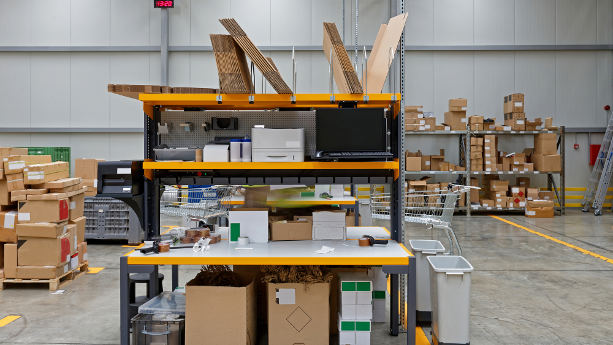-
- EMC测试 RoHS测试 EN71测试 质检报告 医疗整改 UN38.3报告 MSDS报告 WERCS认证 PAHS检测 IP防尘防水 CPSIA测试 MEPS认证 EMF测试 RF测试 双酚A检测 IEC62133 LFGB认证 SCCP测试 EMC整改 TSCA认证 JFSL370 失效分析 元器件筛选 盐雾测试 委托检验 IEC62471报告 GJB151B EPEAT认证 REACH测试 CP65认证 ASTM认证
-
检测检验
Amazon Product Lab Testing Requirements: An Overview
Third-party lab testing is mandatory for a growing number of products sold on Amazon.com. In this guide, we explain what Amazon sellers must know about product testing, safety standards, and test report submissions.
Is product lab testing required for all products sold on Amazon?
Amazon requires that products sold on its platform are compliant with the relevant safety standards, substance restrictions, labeling and certification requirements. If you’re selling on Amazon.com in the United States, then your products must comply with US product regulations. Likewise, products sold on Amazon in Europe must comply with EU product directives and safety standards.
As such, it depends on whether lab testing is required in the country or state in which you intend to sell your product.
That said, keep in mind that all unsafe products are subject to recalls. Third-party lab testing is the only reliable way to assess if a product is safe and compliant – even if third-party lab testing is not compulsory.
It’s also important to mention that pressure is mounting on Amazon to take responsibility for the safety of products sold on its platform. It may not be long before third-party safety testing is mandatory for all products sold on Amazon.com.

For which products is lab testing required on Amazon?
Whether product testing is mandatory or not depends on the applicable regulations. For example, all children’s products sold in the USA must comply with the CPSIA – which in turn requires test reports issued by a CPSC accepted testing lab.
Here are some products for which lab testing is usually required:
There are also cases in which Amazon sets the bar higher than the legal requirements. A few years ago, Amazon.com forced all hoverboard sellers to provide valid UL 1642 and UL 60950-1 test reports.
What’s interesting here is that UL standards are voluntary. Still, the way Amazon dealt with hoverboard sellers demonstrates the fact that they do have the power to require compliance safety standards that exceed those imposed by the government.
This requires that sellers understand both product regulations and any additional standards required by Amazon.
How do I know which tests I need for my product?
Amazon product safety guides can be found in the Amazon Seller Central. Here are some product categories they cover:
Amazon normally lists mandatory standards for which a corresponding test report must be provided.
Example: Power Banks (Link)
Example: Children’s Jewelry (Link)
You can also request an assessment of applicable safety standards and testing requirements from a third-party testing company.
Which lab testing companies are accepted by Amazon?
This also depends on the specific product. For example, children’s product test reports must be issued by a CPSC accepted testing company. This is not an Amazon-specific requirement, but mandatory for all children’s products sold in the United States.
For certain product categories, such as power banks, Amazon requires that the testing company is accredited (e.g. ILAC ISO 17025).
Generally speaking, test reports issued by well-known testing companies such as QIMA, Bureau Veritas, Intertek, Eurofins, and SGS are accepted. You can also search testing companies on the Amazon Service Provider Network.
How do I submit a test report to Amazon?
Amazon will normally contact sellers when they require test reports, which can be submitted via email. Amazon may require test reports after you list a new product, or at a later date. Failing to provide a test report may result in the product being removed.
Can I provide a test report from my supplier?
Some sellers attempt to use existing test reports held by the supplier. This is rarely a workable option for the following reasons:
1. The test report must be valid for the same product/SKU (not a ‘similar’ or an entirely different product)
2. For some products, the test report must be valid for the same production run. As such, you cannot use ‘old’ test reports.
3. Test reports held in the supplier’s name can sometimes not linked to the product you’re selling. This is often the case when you buy the product from a trading company, which in turn provides a test report held by the original manufacturer. Further, some regulations explicitly require that the test report is held by the importer.
In short, there are few scenarios in which you can use a test report held by a supplier, or other company.
机构名称:深圳市智通检测技术有限公司(CNAS资质,国家级CMA资质,药监局直接认可报告)
联系方式:客服何工 13049354532
关于我们:我们是一家综合性的第三方检测认证机构,专注于为客户提供检测、认证以及技术咨询与培训等服务,在医疗器械注册检验报告:电磁兼容检测,安规检测,性能检测,环境可靠性检测等方面颇具优势,国际认证等技术实力行业领先。
我们的技术能力获得了众多国内外权威机构和组织的认可和授权,通过了中国合格评定国家认可委员会认可(CNAS),获得检验检测机构资质认定(CMA)、农产品质量安全检测机构(CATL)以及众多政府和行业权威机构的认可资质,汽车电子,轨道交通,V2X、eCall & ERA-GLONASS认证资质,是农业部“三品一标”检测实验室、全国土壤污染详查推荐检测实验室、中国CB实验室,出具的证书、报告具有国际公信力,可帮助客户稳健开拓本地市场乃至全球市场。
作为一家拥有高度社会责任感的企业,我们以助推各区域经济高质量发展、助力企业品质提升为己任。目前,我们的服务能力覆盖汽车、航空、轨道交通、船舶、通信、电力、电子电器、食品、环保、农业、医疗、石化等领域,凭借专业的计量检测技术之力,我们可帮助各行业产业链上下游客户提升自身竞争力,实现产品全寿命周期的质量管控。
优势项目:电磁兼容EMC检测,YY9706.102-2021,GB9706.1-2020,医疗器械产品注册检验报告(国家级CMA资质,药监局认可),中国SRRC认证,中国CCC认证,中国CTA入网许可,欧盟CE认证,DCMM认证,美国FCC认证,印度BIS认证,印度WPC认证,韩国KC认证,日本TELEC认证,计量校准,汽车eCall认证,轨道交通型式试验,国军标GJB151B检测……
